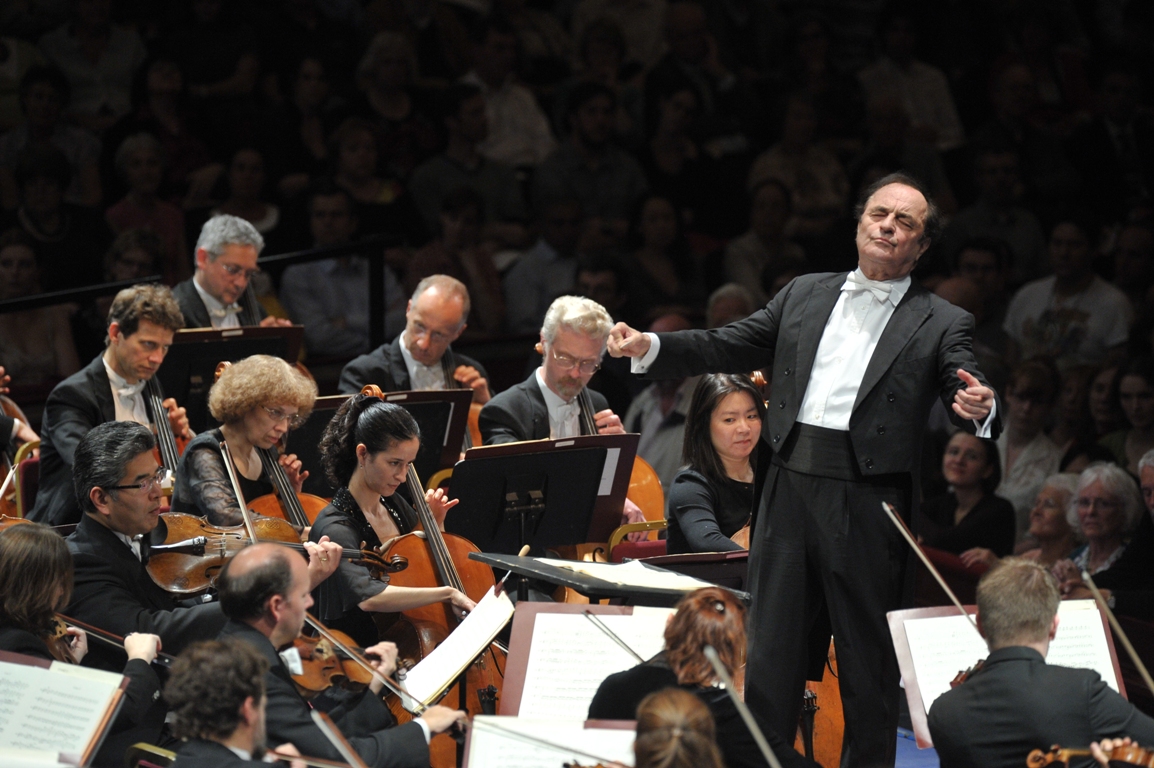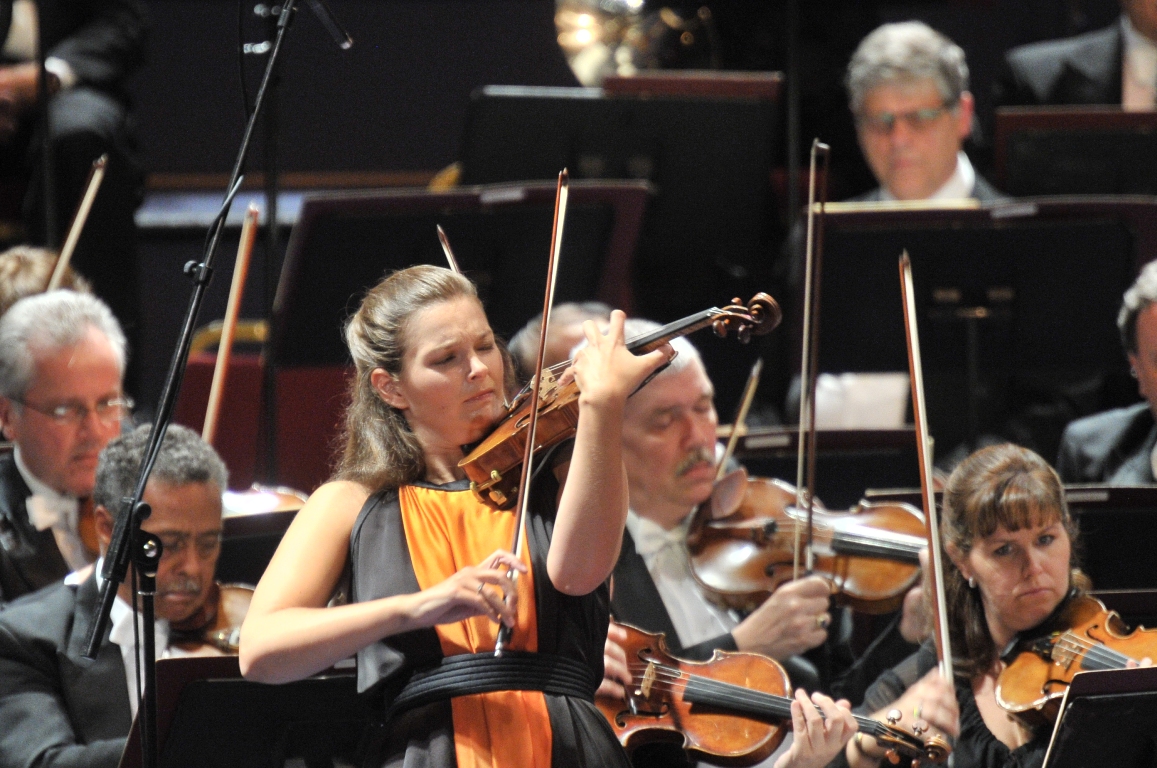BBC Proms: Jansen, Philadelphia Orchestra, Dutoit | reviews, news & interviews
BBC Proms: Jansen, Philadelphia Orchestra, Dutoit
BBC Proms: Jansen, Philadelphia Orchestra, Dutoit
Supreme, epic Tchaikovsky numbers among the best of this year's concertos
After filing for bankruptcy earlier this year, the Philadelphia Orchestra seemed poised to be the flagship cultural casualty of the financial crisis. Five months on and the bills continue to rise, but in the best Titanic tradition the band are determinedly playing on. It’s been five years since we last heard them at the Proms and their return last night under Chief Conductor Charles Dutoit saw a capacity crowd turn out to show their support and to hear the glossy music-making for which this orchestra is so justly celebrated.
For a partnership so synonymous with French repertoire, the Philadelphia Orchestra’s Proms programme seemed disappointingly light on Gallic offerings. Ravel’s “apotheosis of the waltz” La valse offered the only scheduled excursion into the colouristic world that Dutoit has made so much his own. But a short podium speech from the conductor reminded us of London’s affection (as well as Dutoit’s own) for the music of Berlioz, and promised us an encore in the form of the Hungarian March from his Damnation of Faust.
With Terry Gilliam’s recent wartime visuals for ENO still fresh in the mind, this piece of worldly musical cynicism felt even more logical as a postscript to the Ravel – a rictus grin and a shout of ignorant triumph in the face of death and societal decay. Dutoit’s woodwind minced and fluttered with complacent disregard for the threat lurking in cymbals and brass, and we grew from cheery march to something altogether more sinister with such gradual tread that the discovery of our arrival was painful indeed.

Dutoit (pictured right) may not be the kind of conductor to get his hands dirty at the business end of the action, but there’s a lot to be said for his relationship with this orchestra, who gamely take up interpretative responsibility at the point where he relinquishes it. The corporate effort here yielded a swaying balance of strings (whose heady blend never obscured the solo woodwind contributions) that grew into an ever more bewildering montage of musical images.
While Rachmaninov’s Symphonic Dances stayed just the right side of Ben Hur, sleek but never smug in their cinematic excess, it was the Tchaikovsky Violin Concerto that everyone had come to hear. Janine Jansen (pictured below), relegating recent Proms memories of Mutter, Midori, Shaham, even Tetzlaff into the slightly foggy middle distance, brought such presence and melodic focus that even the never-quite-silent Proms crowd seemed to catch the stillness at the heart of her technical whirlwind.

I can’t think of a more appropriate orchestra to appear as the Proms’ final visiting ensemble before John Eliot Gardiner and the Monteverdi Choir and then the BBC Symphony Orchestra round off this year’s Proms. In bidding farewell to the 2011 festival season we look ahead to another year of cuts and crises in the arts, to still more difficult decisions and impossible sacrifices. The Philadelphia Orchestra are both a cautionary tale and a source of hope – a reminder of the very real threats the classical world faces, but also of the generous musicianship (and, let us not forget, philanthropy) that will not let itself be extinguished even in the face of such challenges.
Share this article
more Classical music
 Bell, Perahia, ASMF Chamber Ensemble, Wigmore Hall review - joy in teamwork
A great pianist re-emerges in Schumann, but Beamish and Mendelssohn take the palm
Bell, Perahia, ASMF Chamber Ensemble, Wigmore Hall review - joy in teamwork
A great pianist re-emerges in Schumann, but Beamish and Mendelssohn take the palm
 First Persons: composers Colin Alexander and Héloïse Werner on fantasy in guided improvisation
On five new works allowing an element of freedom in the performance
First Persons: composers Colin Alexander and Héloïse Werner on fantasy in guided improvisation
On five new works allowing an element of freedom in the performance
 First Person: Leeds Lieder Festival director and pianist Joseph Middleton on a beloved organisation back from the brink
Arts Council funding restored after the blow of 2023, new paths are being forged
First Person: Leeds Lieder Festival director and pianist Joseph Middleton on a beloved organisation back from the brink
Arts Council funding restored after the blow of 2023, new paths are being forged
 Classical CDs: Nymphs, magots and buckgoats
Epic symphonies, popular music from 17th century London and an engrossing tribute to a great Spanish pianist
Classical CDs: Nymphs, magots and buckgoats
Epic symphonies, popular music from 17th century London and an engrossing tribute to a great Spanish pianist
 Sheku Kanneh-Mason, Philharmonia Chorus, RPO, Petrenko, RFH review - poetic cello, blazing chorus
Atmospheric Elgar and Weinberg, but Rachmaninov's 'The Bells' takes the palm
Sheku Kanneh-Mason, Philharmonia Chorus, RPO, Petrenko, RFH review - poetic cello, blazing chorus
Atmospheric Elgar and Weinberg, but Rachmaninov's 'The Bells' takes the palm
 Daphnis et Chloé, Tenebrae, LSO, Pappano, Barbican review - lighting up Ravel’s ‘choreographic symphony’
All details outstanding in the lavish canvas of a giant masterpiece
Daphnis et Chloé, Tenebrae, LSO, Pappano, Barbican review - lighting up Ravel’s ‘choreographic symphony’
All details outstanding in the lavish canvas of a giant masterpiece
 Goldscheider, Spence, Britten Sinfonia, Milton Court review - heroic evening songs and a jolly horn ramble
Direct, cheerful new concerto by Huw Watkins, but the programme didn’t quite cohere
Goldscheider, Spence, Britten Sinfonia, Milton Court review - heroic evening songs and a jolly horn ramble
Direct, cheerful new concerto by Huw Watkins, but the programme didn’t quite cohere
 Marwood, Power, Watkins, Hallé, Adès, Bridgewater Hall, Manchester review - sonic adventure and luxuriance
Premiere of a mesmeric piece from composer Oliver Leith
Marwood, Power, Watkins, Hallé, Adès, Bridgewater Hall, Manchester review - sonic adventure and luxuriance
Premiere of a mesmeric piece from composer Oliver Leith
 Elmore String Quartet, Kings Place review - impressive playing from an emerging group
A new work holds its own alongside acknowledged masterpieces
Elmore String Quartet, Kings Place review - impressive playing from an emerging group
A new work holds its own alongside acknowledged masterpieces
 Gilliver, LSO, Roth, Barbican review - the future is bright
Vivid engagement in fresh works by young British composers, and an orchestra on form
Gilliver, LSO, Roth, Barbican review - the future is bright
Vivid engagement in fresh works by young British composers, and an orchestra on form
 Josefowicz, LPO, Järvi, RFH review - friendly monsters
Mighty but accessible Bruckner from a peerless interpreter
Josefowicz, LPO, Järvi, RFH review - friendly monsters
Mighty but accessible Bruckner from a peerless interpreter
 Cargill, Kantos Chamber Choir, Manchester Camerata, Menezes, Stoller Hall, Manchester review - imagination and star quality
Choral-orchestral collaboration is set for great things
Cargill, Kantos Chamber Choir, Manchester Camerata, Menezes, Stoller Hall, Manchester review - imagination and star quality
Choral-orchestral collaboration is set for great things

Add comment